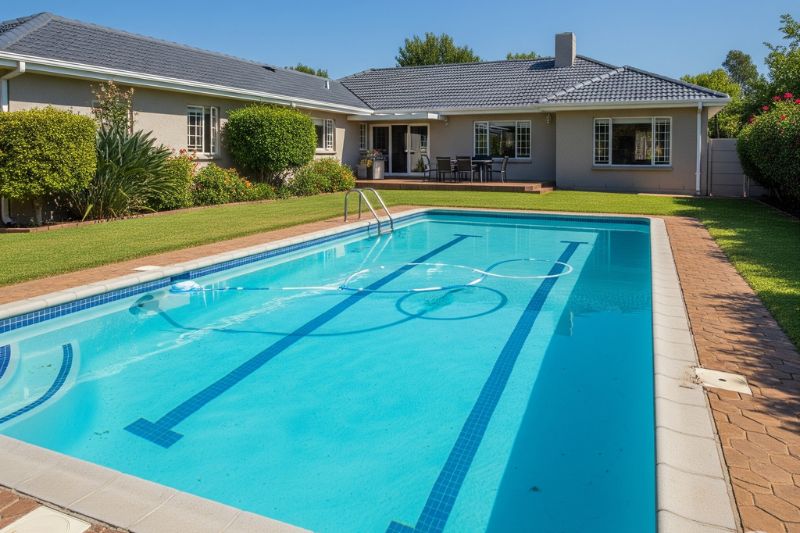
How Do I Prevent Waterline Stains in my Pool?
Share
Clean the waterline weekly and use a weekly enzyme treatment to break down oils and debris. Try our AquaDoc Weekly Enzyme Treatment.
What Causes Waterline Stains?
Stains at the waterline form as a result of buildup where the water's surface meets the pool wall. As water evaporates, it leaves behind residue from oils, metals, and organic debris.
Common causes include:
-
Sunscreen and body oils from swimmers
-
Dust, dirt, and pollen
-
High levels of calcium or metals
-
Algae spores and scale from poor water balance
-
Foam and bubbles from personal care products or algaecide
All these elements float on the surface, and when the water level fluctuates or the pool sits unused, residue sticks to the tile or vinyl.
Step-by-Step: How to Prevent Waterline Stains
Step 1: Keep Water Balanced
Imbalanced water makes stains more likely by allowing calcium, scale, and algae to form.
-
Test your water at least twice per week
-
Maintain pH between 7.4 and 7.6
-
Keep alkalinity between 80 and 120 ppm
-
Keep calcium hardness between 200 and 400 ppm
-
Monitor chlorine levels and adjust as needed
Balanced water helps everything else work better and limits the conditions that lead to scummy buildup.
Step 2: Brush the Waterline Weekly
This is one of the easiest habits that can prevent long-term staining.
-
Use a soft-bristle brush for tile or a vinyl-safe brush
-
Brush the entire waterline once a week
-
Focus on corners, steps, and around return jets where buildup starts
Don’t wait until you see buildup. Prevent it with regular brushing.
Step 3: Use Enzymes to Break Down Oils
Enzyme-based pool treatments help reduce the presence of oils and scum.
-
Add enzymes weekly during heavy use or after parties
-
Use an enzyme product labeled for pools
-
Combine with phosphate removers if your pool is prone to algae
Enzymes target body oils and lotions, making it harder for a scum ring to develop.
Step 4: Skim and Vacuum Often
Organic debris adds to the material that collects at the waterline.
-
Skim daily during pool season
-
Vacuum weekly to remove fine dirt
-
Empty skimmer baskets two to three times per week
Removing this waste before it breaks down keeps the water cleaner overall.
Step 5: Rinse Before You Swim
Encourage swimmers to rinse off before entering the pool.
-
Install an outdoor shower or garden hose near your pool
-
Post a simple sign as a reminder
-
Ask guests to remove lotion, hair products, or heavy cosmetics beforehand
This step reduces the oils and sunscreen that lead to scum buildup.
Step 6: Watch for Metals and Hard Water
Metals like iron and copper can discolor tile and vinyl.
-
Test for metals if your water source is from a well
-
Use a hose filter or metal sequestrant when topping off
-
Avoid copper-based algaecides if you’ve had staining in the past
If your calcium hardness is too high, it can also lead to white, crusty scale forming at the waterline.
Step 7: Cover the Pool When Not in Use
Debris, dust, and oils from the air all land on your pool surface.
-
Use a solar or safety cover when your pool is idle
-
Keeps contaminants out and slows evaporation
-
Helps maintain chemical balance longer
A cover is especially useful during windy or stormy weather.
Step 8: Use Scum Absorbers and Tile Cleaners
Add-ons like scum absorbers and specialty cleaners help maintain a clean waterline.
-
Scum sponges float on the surface and absorb oils
-
Clean tile monthly with a pool-safe tile cleaner or baking soda paste
-
For stubborn spots, use a pumice stone labeled safe for pool use
Regular touch-ups prevent buildup from becoming stains.
Bonus Tips for Preventing Waterline Problems
-
Backwash your filter or clean cartridges regularly
-
Do not overuse foaming chemicals or algaecide
-
Keep pets out of the pool if possible
-
Check and adjust water level after rainfall or draining
-
Maintain chlorine levels at 1 to 3 ppm to prevent algae
A clean waterline isn’t just for looks. It reflects the overall cleanliness and care of your pool. With a simple weekly routine, you can avoid stubborn stains and enjoy a pool that looks fresh and inviting every time you take a swim.
